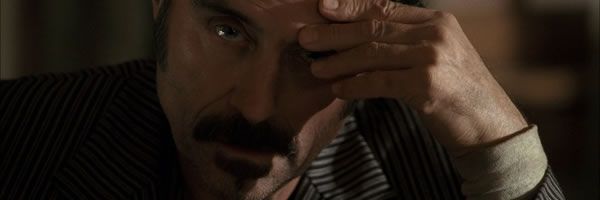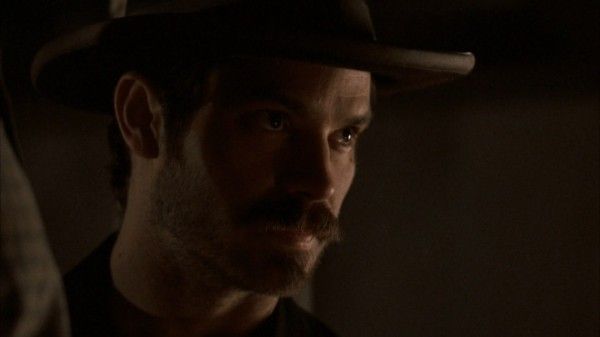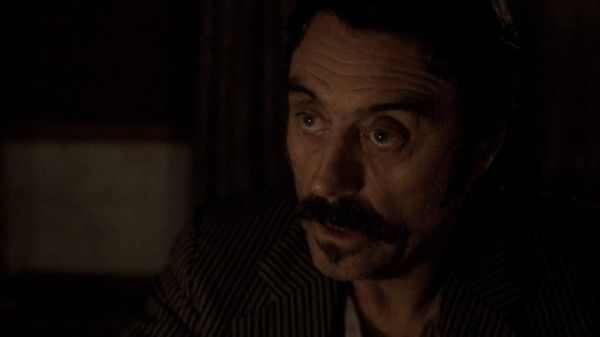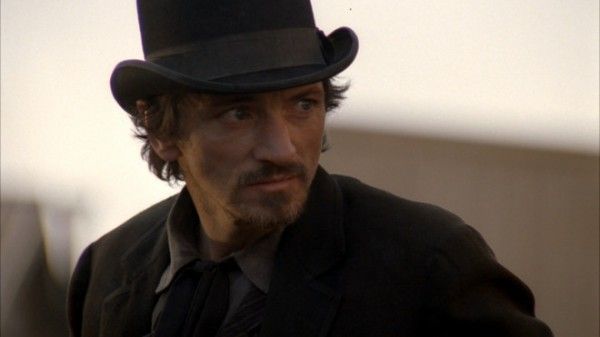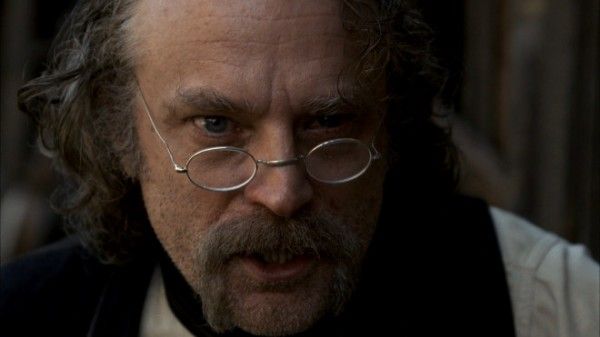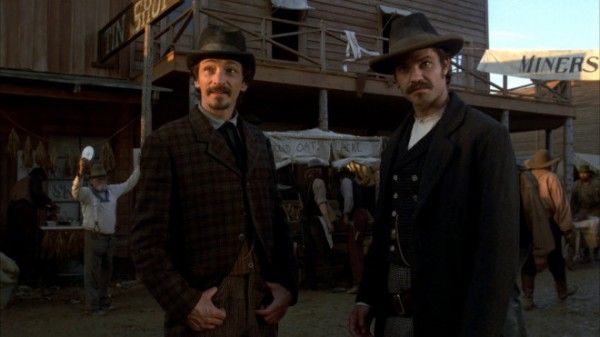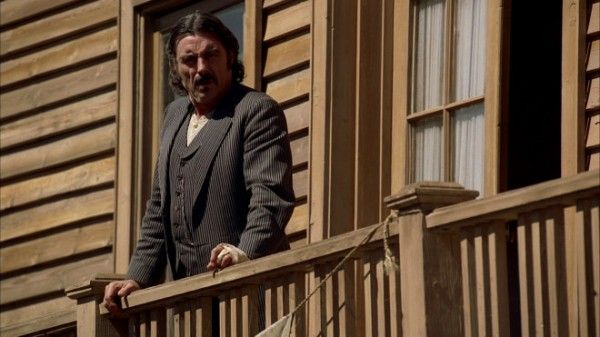There’s a bitter pill to swallow in owning the Deadwood complete series on Blu-ray. One of the best shows ever to be on television, Deadwood ends unceremoniously. There is no sense of closure, there is no sense of a finished narrative - creator David Milch gets a twenty minute segment on the set to talk about the end of the show and expresses nothing but frustration about the show’s demise. He tries to intellectualize it, but struggles to come to grips with the euthanasia HBO performed. Alas, with an existing set and the cast of characters Deadwood had it was not a cheap show, and where The Wire was able to struggle against low ratings Deadwood fell because it never exceeded its modest but committed fanbase. But Deadwood is one of the best shows ever put to television, and I come here not to mourn its end, but celebrate its greatness. My review of Deadwood: The Complete Series on Blu-ray follows after the jump.
Based on a real adventures of a boomtown, Deadwood starts with Seth Bullock (Timothy Olyphant) coming to town with his partner Sol Star (John Hawkes) in the hopes of setting up a hardware store. They come just as Alma Garret (Molly Parker) arrives as an addict whose husband Brom Garret (Timothy Omundson) wants to find gold much like the other prospectors who’ve headed to Deadwood in hopes of striking it rich. As he’s a city boy with no real experience, he has the word “mark” virtually tattooed on his forehead. He’s easy prey for the town’s biggest predator Al Swearengen (Ian McShane), and his gang of neer-do-well’s - including barkeep/genial gadfly E.B. Farnum (William Sanderson), Do-dirt dudes Dan Dority (W. Earl Brown), Silas Adams (Titus Welliver), and Johnny Burns (Sean Bridgers). Also at Al’s saloon The Gem, he’s got a lead prostitute in Trixie (Paula Malcomson), and a crippled cleaner in Jewel (Geri Jewell).
Swearengen has a rival in Cy Tolliver (Powers Boothe), who runs a casino and whorehouse as well, with Joanie Stubbs (Kim Dickens) running the whores, and with Leon (Larry Cedar) Eddie Sawyer (Ricky Jay) and Con Stapleton (Peter Jason) as part of his staff. The town also has a doctor in Doc Cochran (Brad Dourif), who – like E.B.- is smart about what he knows and what he lets on to know, which also goes for the town’s newspaperman A.W. Merrick (Jeffery Jones). The town is made famous by some of its earliest inhabitants, which include Wild Bill Hickok (Keith Carradine), and Calamity Jane (Robin Weigart). Hickok leaves the show as history dictates when an insane young man (Garrett Dillahunt) decides to take him out.
As the town comes into greater relief, it becomes apparent there will be some need for law and order, so Olyphant’s Bullock is roped into being the town’s sheriff with E.B. Farnum made mayor, Charlie Utter (Dayton Callie) is made deputy and all of the major players in town are made part of the city council. Where Brom Garret may have been a mark, the land he was sold actually produces gold, which turns Alma into a rich widow after her husband is murdered. Alma must work to control that land whilst still being a woman. She ends up adopting Sofia Metz (Bree Seanna Wall) when her family is killed by men that may have had a different target. Swearengen and Bullock clash, but as the town grows, they form uneasy alliances based on convenience, and possibly respect.
Al comes to a relationship with Mr. Wu (Leone Young) who runs the Chinatown section of town, replete with prostitutes that aren’t fed (they literally are fucked to death), while Seth and Alma have an attraction and an affair stymied by the arrival of his wife Martha (Anna Gunn), a relationship that has little to no sexual heat. Trouble comes to town in the form of George Hearst (Gerald McRaney), a successful prospector seeking to run the town, with the assistance of people like L.D. Kellogg (Garrett Dillahunt again). Then there’s people like “The Nigger General” (Franklin Ajaye), and then in season three a troupe of actors led by Jack Langrishe (Brian Cox). And with Bullock occupied by his returned wife, another suitor comes to Alma in the form of Whitney Ellsworth (Jim Beaver).
One of the most appealing - but also frustrating for newcomers - things about Deadwood is how much of what’s going on is like watching the tectonic plates moving as a city and an environment achieves – if not stability than - a level of functionality. Prostitutes and drinking are going to be constant, but order must be maintained, and Al Swearengen knows that as much as Seth Bullock. The interesting thing that comes to the head of Season Two is that Al and Seth’s relationship mutates, so it’s not so much that the two are butting heads, but silently colluding with each other, as each pushes one to do the right or wrong thing. And the greatest thing about shows like this is that it respects the density and rich tapestry a prolonged narrative can provide. One of my favorite bits developed in the show is the subplot between Calamity Jane, an unrepentant drunk and loser, and Joanie Stubbs. Jane – especially in our modern landscape – is typed Sapphic, and their odd courtship is one of the great minor narratives of the show.
But the film works because of the yin and yang of Swearengen and Bullock. Timothy Olyphant is playing the good guy, but as Olyphant notes, he’s a guy who can barely keep his tempers in check, and though he believes in and understands right and wrong and stands up for the right, he borders on fascism. This ties into frontier justice and the like, but in modern context and in the light of the show, he’s a brute. Olyphant is one of the great movie stars, but it seems he’s shined brightest on television. Between this and his recent FX show Justified, he’s one of those guys you can watch doing most anything - Olyphant seems at his best playing cowboys and here he’s perfect. But the reason why the show exploded was partly because of the vividness of Ian McShane’s Swearengen. The name (taken from real life) couldn’t be more apt, as the character became infamous for his use of foul language and specifically the term “cocksucker.” Swearengen is one of the greatest characters ever put to television: his anti-hero swagger, and murderous ways start the show in high style, and he appears to be a great villain. But as the show progresses (and with the introduction of Hearst), the show manages to humanize him in such a way that we understand him as only the length of this narrative can suggest. One of the show’s great running conceits is that Al talks to himself whilst receiving oral pleasures from one of his girls. It’s awkward and personal, but also an ingenious way for the show to have him deliver his soliloquies.
And if the show has lasted beyond its cancellation, it’s because of the writing. Like most TV shows, it’s shot well enough, and there are some incredible technicians behind the camera, working from the template Walter Hill struck in the pilot episode. But it’s the language of the show that made it so beloved, and why it’s one of the greats. The mixture of alliteration, quotation, poetry and profanity makes every scene one to which one must watch with open ears.
Alas, the show was such a dense narrative field that it was virtually impossible to get new viewers who hadn’t started from the beginning. I tried watching the Season Two pilot as my frist attempt during the show’s run, and was left cold. But now with DVD and Blu-ray the show can be watched in its entirety and it strikes as something that deserves and rewards revisiting, as every nuance is measured, and much of the show (while still having a certain fluidity) builds with each season. This was my first time through, and I’m a convert. This is the real deal.
HBO’s Blu-ray set includes everything. I can’t wait until they do this with The Wire though that was 4x3, so it makes a little less sense, but still. The show and all the DVD supplements are presented over a thirteen disc set. Almost all of the supplementary material could have been relegated to one disc, but this set represents the HBO way – all class, all luxury. Every episode is presented in picture-perfect widescreen (1.78:1) and in 5.1 DTS-HD surround. The presentation is immaculate. This is how the show should look, and the rich details and dust and swagger are preserved here.
Each season is broken up over three discs, with four episodes on each, and a supplemental disc is included for each season, along with an additional bonus disc. Season One offers commentary on the first episode by creator David Milch, on episode four with stars Molly Parker and Keith Carradine, episode five with stars Brad Dourif and Robin Weigart, and on the first season’s final episode with stars Timothy Olyphant and Ian McShane. Disc four offers featurettes “Making Deadwood: The Show Behind the Show” (14 min.) with comments from the cast and crew, along with “The Real Deadwood” (26 min.) with comments from Milch and historians, and “The New Languages of the Old West” (30 min.) with Milch and Carradine in conversation. It concludes with “An Imaginitive Reality” (28 min.), which offers more of Milch and Carradine in discussion about the show (it seems broken up under the old rule of how anything under 30 minutes means people get paid less). The makers of the show – especially Milch – are very thoughtful about the show, its creation and the characters, so all the supplements are worth poring over.
For season two, the first episode has two commentaries, the first by McShane and Olyphant, the second with Parker and Anna Gunn. The third episode has a commentary by Milch, and the fifth by Director/Executive producer Gregg Feinberg. Episode seven has two commentaries as well, the first with Kim Dickens, William Sanderson and Dalton Callie, the second with Powers Booth and Garret Dillahunt. Episode ten offers a commentary by John Hawkes and Paula Malcomson, while episode eleven has two commentaries, the first by Olyphant and Gunn, the second by McShane and Malcomson. The supplemental disc here has the featurettes “The Real Deadwood 1887” (21 min.), and then a piece on the making of season two’s finale broken into three pieces. “Trusting the Process with David Milch” (27 min.) on the writing and behind the scenes (with comments from the actors), “Mr. Wu Proves Out” (22 min.) on the plot mechanics of one of the big sequences, and “The Wedding Celebration” (22 min.), which shows the cast practicing dancing. “Deadwood Daguerrotypes” is a still gallery of pictures from the period.
Season Three offers a commentary on episode one by executive producers Gregg Feinberg and Mark Tinker, and then a commentary on episode five with stars Jim Beaver, Sean Bridgers and W. Earl Brown. Episode nine has the thoughts of star Robin Weigert, while the series’ finale has a commentary by David Milch. The bonus disc here (the lightest of the bunch) includes the historical featurette “Deadwood Matures” (20 min.), and then “the Education of Swearengen and Bullock” (20 min.), on their changing relationship. The disc rounds out with more pictures from the period in “Deadwood Daguerrotypes.”
Also included is a bonus disc. This starts with “The Meaning of Endings” (23 min.) which has David Milch walking through the sets and talking about would have happened had the show continued. He’s pissed and it shows, and it’s great to watch. This is followed by “The Real Deadwood: Out of the Ashes” (29 min.), which offers a historical perspective to the end of the show and what followed. This is followed by a cast and crew Q&A for the second season at the Paley Center (64 min.), with all of the main leads (Olyphant, Parker, McShane, Hawkes, Malcomson, Booth) and Milch and Feinberg talking about the show. There’s a “360 tour” of the set with Milch (8 min.), and then the best supplement of the disc: “Al Swearengen Audition Reel (as performed by Titus Welliver)” (10 min.) which has the co-star playing some of the most famous actors in the world auditioning for Milch, with Welliver doing Milch and performers like Al Pacino. His imitations are spot on - especially of Milch - and it’s the perfect light note to end the set. It definitely helps salve the wound of the lack of more. And that’s one of the best things about the series, even as it hurts: there were no compromises, and you walk away from it knowing that it’s an incomplete but thoroughly compelling work.

